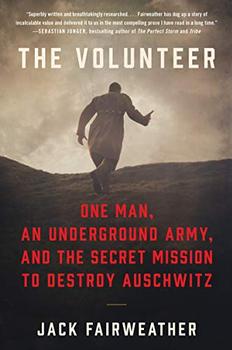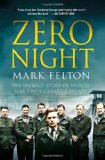Summary | Excerpt | Reviews | Beyond the book | Read-Alikes | Genres & Themes | Author Bio

A True Story of World War II
by Denis Avey, Rob BroombyThe Man Who Broke into Auschwitz has an eye-catching title and jacket copy, but each does the author a disservice. The exchange highlighted so prominently encompasses only 15 pages of the narrative, and it's a bit of a letdown compared to the rest of the author's experiences. The book is actually a gripping war-time memoir that covers Denis Avey's entire military service, from the time he enlists in the Rifle Brigade in 1939 through his repatriation more than five years later. The reader follows him as he fights in the deserts of Africa, is wounded and captured, and is transported to Europe on a ship that is torpedoed by Allied forces along the way. Later he is imprisoned, escapes, is recaptured, and eventually sent on a railway cattle car to labor camp E715 where he performs slave labor alongside Jewish prisoners in the I.G. Farben Buna-Werke industrial complex. Also relayed are Avey's experiences after the war, including his battles with post-traumatic stress disorder (PTSD), his decision to tell others about his wartime experiences, and his discovery of the fate of one Jewish man he helped while at the labor camp.
The author's astonishing story is conveyed in a simple first-person style using short, choppy sentences without a lot of description. I found the early sections of the book somewhat slow-going, particularly because it felt so emotionally distant. While Avey's narrative eventually drew me in, it fell short in evoking empathy. Given the terrible actions he both witnessed and perpetrated and the horrendous conditions in which he lived during his five years of service, I would have liked the story to engage my emotions more.
...I heard the menacing sound of planes overhead. A handful of Savoias swooped low. There was no anti-aircraft cover, so we were on our own. I managed to get hold of a tommy gun that I had been entrusted with, and I let loose most of a magazine. Even at that range it had no effect. It was a clumsy thing. We hit the deck but the bombs exploded well away from us. After one pass the sky was clear and I breathed a little easier. They had better targets that day.
It makes one wonder what the book would have been like if his co-author had been a novelist rather than a journalist.
Particularly striking is the author's brutal honesty about his own actions in the war. For example, after his ship was torpedoed, he found himself on top of a crate floating in the ocean with other survivors clinging to its sides. "The others were just too weak to pull themselves out," he writes. "I didn't think of helping any of them. To offer a hand would have risked being pulled in. I had to think of number one. Without number one, there was nothing... They slipped off silently one by one. They were there, and then they were gone. That's how it was." It's a rare person who is willing and able to confess that they put themselves first in their quest for survival. Avey accepts that his actions were necessary and places no blame on himself for them.
Stories abound of the atrocities committed in the Nazi camps, so the brutality Avey relates should come as no surprise to readers. He recounts scenes of horror and death that have continued to haunt him over the decades, and the incidents he describes will likely stay with readers as well; this book is not for the faint of heart.
The Man Who Broke into Auschwitz is a fascinating memoir that certainly engages the mind, if not the soul; it answers the question, "What happened?" as opposed to "What was it like?" Those who enjoy wartime chronicles will undoubtedly find much of interest in its pages. Is it a stand-out example of its genre? Not necessarily, but it is definitely an excellent addition to it.
Editor's note: There has been some debate among critics and historians as to the accuracy of Denis Avey's account of his experiences in Auschwitz III. To find out more, check out the video interview with Avey in which he defends his work.
![]() This review was originally published in The BookBrowse Review in September 2011, and has been updated for the
September 2012 edition.
Click here to go to this issue.
This review was originally published in The BookBrowse Review in September 2011, and has been updated for the
September 2012 edition.
Click here to go to this issue.

If you liked The Man Who Broke Into Auschwitz, try these:

by Jack Fairweather
Published 2020
Winner of the Costa Book of the Year Award. The incredible true story of a Polish resistance fighter's infiltration of Auschwitz to sabotage the camp from within, and his daring escape to warn the Allies about the Nazis' true plans for a "Final Solution."

by Mark Felton
Published 2015
On August 30, 1942 - 'Zero Night' - 40 Allied officers staged the most audacious mass escape of World War II. Told with a novelist's eye for drama and detail, this rip-roaring adventure is all the more thrilling because it really happened.
It was one of the worst speeches I ever heard ... when a simple apology was all that was required.
Click Here to find out who said this, as well as discovering other famous literary quotes!
Your guide toexceptional books
BookBrowse seeks out and recommends the best in contemporary fiction and nonfiction—books that not only engage and entertain but also deepen our understanding of ourselves and the world around us.